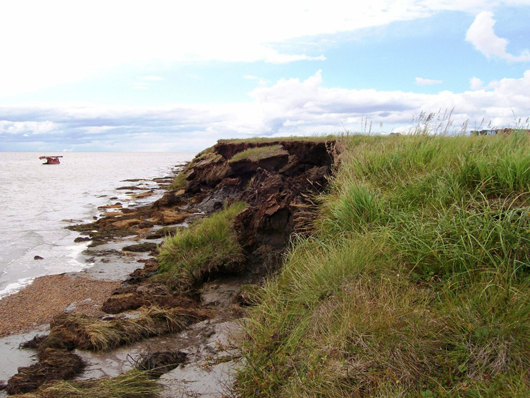Newtok poised to be relocation model for climate-imperiled villages
With $15 million in support, the Denali Commission will push forward with relocation of the Alaska village.

New money from the federal budget to the Denali Commission will be used to push forward with the relocation of an Alaska village hard hit by climate change – and will, officials hope, set an example for planned relocations of other villages.
The spurt of money, $15 million, comes from the federal budget legislation signed by President Trump on March 23. It is a far cry from the estimated $130 million that would be needed to create an entirely new village away from the eroding Newtok site, said Joel Neimeyer, federal co-chair of the Denali Commission. But it is enough to give relocation a big push, he said.
“But you need a certain level of – I’m going to use a chemistry term here – of activation energy,” Neimeyer said.
The Denali Commission, established in 1988, is a federal agency designed to coordinate and promote infrastructure and economic development in rural Alaska. It was modeled in part after the 53-year-old Appalachian Regional Commission, which serves a similar function for rural communities in that part of the nation.
The Trump administration last year proposed eliminating the Denali Commission, along with its Appalachian counterpart. Instead, Congress in the funding bill appropriated a total $30 million for the Alaska commission, including the $15 million that will go to Newtok’s relocation.
Now the Denali Commission has become the federal agency that is not just coordinating village relocation efforts but implementing them, Neimeyer said.
Newtok, a Yupik village of 350 on the rapidly eroding Ningliq River, is teed up as the first to move, and is become a model for the other climate-imperiled villages, he said.
Newtok is aiming for complete relocation to a new village site called Mertarvik. The Newtok site is on permafrost that is thawing and being eaten away by the river, putting current structures in peril. The new village, on safer ground about nine miles away, is already in development, with an access road, boat ramp, a few houses now built and completion of a foundation that will be used for an emergency center.
A blueprint of sorts for the new village is contained in the Denali Commission’s newly released final environmental impact statement for Newtok relocation. The preferred alternative in the EIS describes several public facilities that would be built – including an airport, school, water-treatment plant, power plant and energy infrastructure – along with additional homes. Comments on the EIS are being accepted through April 9, and a record of decision is expected after then.
Many of those big facilities are already in various federal and state appropriations queues, Neimeyer said. But they depend on a critical mass of residents getting established in Mertarvik, he said. That is where the $15 million in new appropriations comes in, he said.
If the Denali Commission, the village of Newtok and the other participating agencies are able to leverage the $15 million into significant progress, that will demonstrate that Alaskans are capable of using relocation funding wisely and effectively.
“But if we don’t do this well, I don’t know if Congress is going to open up the checkbook for the other communities,” he said.
Of the four Alaska villages considered to be most endangered from climate change – Newtok, Shishmaref, Kivalina and Shaktoolik – Newtok is the most advanced in its ambitious relocation project.
Newtok has some advantages over the other villages, Niemeyer said. An important one, he said, is control of a selected site for relocation; the Mertarvik site has been transferred to tribal ownership through a land trade that was approved by Congress in 2005.
Another advantage Newtok has is the obvious nature of the threat, Neimeyer said. At Newtok, there is chronic erosion that is easy to see and measure, helping build consensus among residents that relocation is necessary, he said. The other communities, located on the Chukchi Sea shoreline, are imperiled more by what would be a catastrophic storm surge and flooding event which has not yet happened, he said. That makes it a little more difficult to build consensus for relocation, he said.
“Everyone in Newtok knows the river’s coming, and they want to go,” he said. “There is a sense, I think, in the other three communities that some people don’t want to go.”
Newtok’s relocation got a different boost earlier in the month when the Federal Emergency Management Agency awarded a $1.7 million grant to purchase and demolish imperiled homes in Newtok. That money will go directly to homeowners.
(Yereth Rosen is a 2018 Alicia Patterson Foundation fellow)